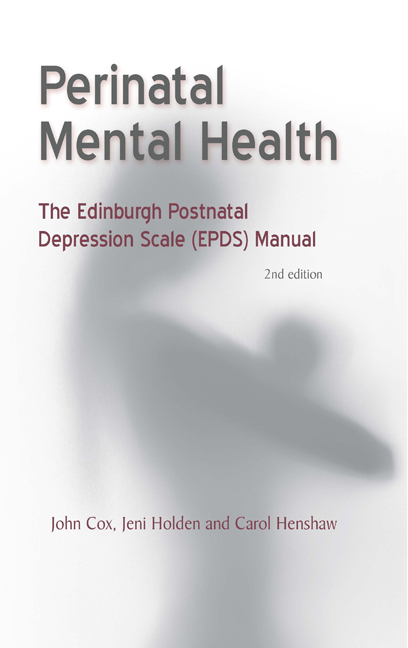Book contents
- Frontmatter
- Contents
- The authors
- Acknowledgments
- Abbreviations
- List of figures
- Foreword
- Preface to the first edition
- Preface to the second edition
- 1 Postnatal depression: an overview
- 2 The origins and development of the Edinburgh Postnatal Depression Scale
- 3 International and cross-cultural issues
- 4 Using the Edinburgh Postnatal Depression Scale in clinical settings: research evidence
- 5 Humanistic and person-centred interventions in perinatal depression
- 6 Screening and intervention services in the community
- 7 Using the Edinburgh Postnatal Depression Scale
- Appendix 1 The Edinburgh Postnatal Depression Scale
- Appendix 2 Translations of the Edinburgh Postnatal Depression Scale
- References
- Index
- Frontmatter
- Contents
- The authors
- Acknowledgments
- Abbreviations
- List of figures
- Foreword
- Preface to the first edition
- Preface to the second edition
- 1 Postnatal depression: an overview
- 2 The origins and development of the Edinburgh Postnatal Depression Scale
- 3 International and cross-cultural issues
- 4 Using the Edinburgh Postnatal Depression Scale in clinical settings: research evidence
- 5 Humanistic and person-centred interventions in perinatal depression
- 6 Screening and intervention services in the community
- 7 Using the Edinburgh Postnatal Depression Scale
- Appendix 1 The Edinburgh Postnatal Depression Scale
- Appendix 2 Translations of the Edinburgh Postnatal Depression Scale
- References
- Index
Summary
The Edinburgh Postnatal Depression Scale (EPDS) has become something of a ‘national treasure’ for perinatal mental health practitioners and researchers. Since it was first developed and described in the British Journal of Psychiatry in 1987, it has been used internationally in many diverse settings, cited more than 3500 times and contributed to our contemporary understanding of the fundamental importance of perinatal mental health for mothers and their families.
This manual is not only what it says on the tin. It is indeed a practical manual with helpful tips on how to use the EPDS in practice and a useful resource of translated versions of the EPDS. But it also offers a research update on depression in pregnancy and the postnatal period by wise, experienced clinicians who have used their humanist, woman-centred approach to integrate insights from other researchers and practitioners, and provides space for women's voices, with frequent use of quotes from qualitative studies to provide context and meaning to the concepts discussed.
The authors make it clear that the EPDS should not be used by health professionals as a tick-box exercise, and emphasise that health professionals who use the EPDS need to be trained in the nature, detection and treatment of perinatal depression, in understanding the experiences of women and in developing listening skills so that they can elicit and respond to psychological issues, including how to respond if women disclose suicidal ideation. There are also reminders to service managers as well as to clinicians, that health professionals including midwives and health visitors will need support to do this work.
The evidence base on interventions for perinatal depression is also provided here, including details of innovative methods such as internet-based therapy. Moreover, the authors highlight how the term ‘postnatal depression’ or ‘perinatal depression’ can be misused, sometimes with tragic consequences, such as when puerperal psychosis is mislabelled as postnatal depression, with a consequent failure of professionals to identify the high risk of psychosis in the postnatal period. Professionals caring for women in the perinatal period always need to take a proper mental health history, and the authors make clear that the EPDS is a complement to the history rather than a substitute.
This volume therefore provides an abundance of treasures inside, and will ensure that the EPDS is used wisely and thoughtfully for the benefit of women across the globe.
- Type
- Chapter
- Information
- Perinatal Mental HealthThe EPDS Manual, pp. xi - xiiPublisher: Royal College of PsychiatristsPrint publication year: 2014



